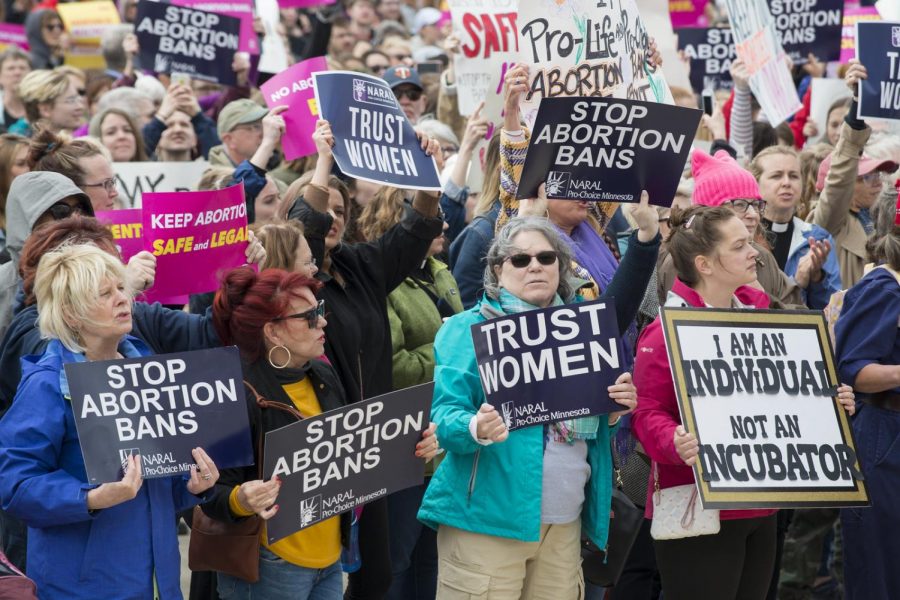How Texas’ Abortion Ban Will Affect Women and Teens
September 28, 2021
Whether you’re pro-life or pro-choice, most people have heard about Texas’ recently implemented abortion ban, S.B.8, or the “heartbeat bill.” On September 1, 2021, a ban on abortions after 6 weeks of pregnancy was passed by Texas lawmakers. The Supreme Court decided not to intervene after their immediate action was requested to stop the bill, and the law was carried out with a vote of 5-4. This means that anyone pregnant under 6 weeks can still receive an abortion, but the new law makes it nearly impossible to do so.
What does this mean for the women in Texas? To avoid debating the morality of pregnancy terminations, a heated and widely argued topic, this article will be focusing on how the lack of abortion access affects women, teens, children in the foster care system, and why the new law pits Texans against each other.
Why is the abortion cut-off so early?
6 weeks of pregnancy is the earliest opportunity to hear a fetal heartbeat. The ban specifies the cutoff for legal abortions at 6 weeks of gestation because new cardiac activity is likely to be heard after this point. However, most women find out they’re pregnant between 5 and 6 weeks after conception. Some women find out they’re pregnant even later. According to a CNN article written by Jessica Ravitz, there are many reasons why some women discover their pregnancies unusually late. For example, women on birth control, chemo-therapy, or women who have irregular periods are less likely to find out about their pregnancies before the 6 week mark.
Because of Texas’ new abortion ban, and the fact that many women do not realize they’re pregnant at 6 weeks, the opportunity to receive a legal abortion now is very slim. Even if the average woman diligently tracks her menstrual cycle, it will likely leave her with a 2 week period to realize she’s pregnant (and for a test to come back positive). The chance of women finding out they’re pregnant, scheduling the procedure, and receiving an abortion—all before reaching 6 weeks of gestation—is nearly impossible.
Who is more likely to get an abortion?
In an article published by MarketWatch, author Meera Jagannathan explains how “75% of women who obtain abortions are low-income, with nearly half living below the federal poverty level.” Women struggling financially may feel they cannot support a child, and will turn to terminating their pregnancies. In some cases, women are unfortunately unable to afford health care. This means they may not have easy access to contraceptives such as the birth control pill or reproductive health services. A 2020 report shows that 14% of working age women live below the Texas poverty level. So, those women (who likely are unable to financially support themselves alone) are more likely to receive an abortion.
How are Texans able to report others?
The new law allows Texas citizens to report anyone that aids or “abets” an abortion, and will reward the reporter a minimum of $10,000 if the case is found to be valid. An article by Andrew Keshner titled, “Texas Abortion Law: $10,000 Penalty Could Incentivize ‘Bounty Hunters’ to Make ‘Tens of Thousands of Dollars’” outlines just how this new policy will work. Anyone who aids in a woman getting an abortion could be fined, meaning the “money damages could well run higher if a lawsuit has many defendants in the case.” Furthermore, an Uber driver, friend, family member, or doctor can be fined thousands of dollars.
This process is a blatant violation of a woman’s right to privacy. The decision to receive an abortion is often not made lightly—it is made with serious consideration. After making the difficult, and possibly traumatic, decision to terminate their pregnancy, women should not be forced to pay money after being “tipped off” by fellow Texans. Allowing citizens to report others will only create a hostile environment of people violating women’s privacy, pitting citizens against one another.
Additionally, many women who decide to go through with an abortion suffer from mental health issues afterward, such as grief, regret, or depression. If Texans are able to report each other, these struggling women may find it extremely difficult to open up about their feelings to others if there’s a risk of their personal information being spread. Abortion is a delicate subject already, but creating an antagonistic atmosphere may cause trust issues in abortion patients and the inability to speak to someone about their mental health after their procedure.
How will the ban affect teen pregnancy rates?
According to the CDC, the birth rate was 24% among Texas teens in March of 2021. This means that, out of every 100 teens, 24 were likely to give birth between the ages of 15 to 19 years old. According to the Texas Adoption Center, “the 2019 Youth Risk Behavior Survey found that 42.7% of Texas teens had engaged in sexual intercourse at least once.” Texas is actually ranked number 9 on a list ranking birth rates among teenagers in the United States.
So, because the teen birth rate among Texas was high before the abortion ban, that birth rate may grow even larger. If this were to happen, more children would be born into unprepared families, unstable homes, or given up for adoption.
Will the abortion ban affect the foster care system?
Adoption, especially among teen parents, is a popular alternative to receiving an abortion. However, according to an article published by the Texas Tribune, over 400 Texan children in June 2021 were placed in unlicensed foster homes. These facilities range from churches, offices, and motels. This is due to many foster care facilities shutting down permanently, causing Texas to “lose at least 1,000 beds for children, mostly from facilities that serve multiple children.”
Additionally, children in foster care may age out of the system, meaning they eventually turn 18 and aren’t adopted. Teens who age out of the system find it more difficult to pay rent, get a higher education, or find long lasting employment. With Texas’ new abortion ban, the amount of children in foster care may increase in the next few years.
That’s not to say the foster care system is inherently bad. If expectant mothers feel they cannot provide the best home for their child, adoption may be the best option for them. If that is what keeps children out of unsafe, unfit, or abusive households, it is a great choice for teen moms to make. Adopted children can find loving, safe homes with parents who care for them. But when there aren’t enough adults to adopt every foster child, kids can wait for years or may never be adopted.
Are there any exceptions?
There are no exceptions for victims of rape or incest. Women, and even young girls, will be unable to receive an abortion if they are troubled by their pregnancy. Victims of rape and incest are often plagued by PTSD or will be distressed by painful memories. This new law will force women, and sometimes children, to carry out their forced pregnancy.
However, according to the New York Times article titled, “Here’s What the Texas Abortion Law Says,” the only exceptions to the ban are medical emergencies, “a term the law does not define.” There are some cases where a medical emergency can be determined easily, such as ectopic pregnancies. Ectopic pregnancies happen when “a fertilized egg implants in a structure that can’t support its growth,” according to the Cleveland Clinic. This is often life-threatening for the mother, and should not be carried full term.
But, other cases are not as obviously clear. Examples of cases that would need to be determined as medical emergencies would be “a cancer patient who cannot receive chemotherapy while pregnant” or “a woman with a heart condition that causes mild symptoms but could lead to sudden cardiac arrest.”
The pro-choice vs. pro-life debate is unlikely to be resolved in the near future. However, Texas citizens reporting others is a violation of privacy, the amount of children in foster care may increase, and the Texas law makes it nearly impossible for women to receive an abortion.
According to an article published by NPR, the Supreme Court will soon hear arguments on whether the banning of “pre-visibility” abortions are unconstitutional. States such as Mississippi, Georgia, Kentucky, and Alabama have laws banning abortions before the Roe v. Wade cutoff of 3 months. So, will the Supreme Court decide to only implement a standard of Roe v. Wade, or will states still be able to implement their own laws individually? Will other states follow Texas’ lead and create extreme abortion bans? What are the future of abortions in the United States?
Image from flickr.com




Jenni • Jun 16, 2022 at 5:26 am
When CPS takes your child, the child only can be adopted if the parents rights are terminated. This rarely happens before the child turns two. If you are going to talk about “adoption” you need to talk about private adoption through agencies that can provide financial assistance to the mother and emotional support throughout the process. Making it seem like adoption happens through foster care is not an accurate picture. It is very hard to adopt out of foster care because the goal of CPS is reunification, not child placement in new homes.